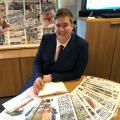Reading voters went to the polls for the first post-war General Election in 1945, but nobody would know the result until the following month as service personnel (who were spread all over the world) also had to have their ballots counted.
A Mrs Drew of Junction Road, Reading cast her vote as the town’s oldest voter at 101, whilst both the major parties Labour and Conservative, confessed that there was nothing out of the ordinary happening as they roamed the polling stations.
Eventually, the results were announced in July, with a landslide victory for Clement Atlee’s Labour Party, which ousted Britain’s wartime leader Winston Churchill.
The veil of secrecy surrounding the BBC’s Caversham Park “listening post” was lifted slightly 74 years ago, when the vital role it played during WW2 was revealed.
Over 600 staff were stationed in buildings around the site, which had been chosen as it was located in a favourable reception area for intercepting radio broadcasts from foreign friends and foes alike. Before the surrender, employees were listening to roughly one and a quarter million words a day, in 32 languages.
In order to cope with the vast amount of world broadcasting, some amazing machinery was used, including the “Hellschreiber” machine, which (ironically) was made in Nazi occupied Europe.
Woodley Aerodrome was the venue for the unveiling of Miles Aircraft’s “Aerovan” passenger and freight aeroplane in 1945. The innovative aircraft had taken its first flight in January and in a post-war world it was hoped the easy conversion from passenger to freight use would make it a world beater.
Fifty-two of the planes were built and supplied to many countries across the globe, seeing service in Africa, Europe and Australasia.
A reception was held at Reading Town Hall for the “Penny-a-week Fund” in aid of the Red Cross, which was launched in 1939 across the country, to draw a penny from workers wages to help fund the organisation.
Greeting guests at the reception was Lord Iliffe CBE, Chairman of the Red Cross and St John Appeal during the Second World War, who presented special coloured metal badges to volunteers who had served the organisation with distinction.
With VE Day still fresh in everyone’s minds, a “Victory Fete” was held at Englefield House, Theale, in June 1945, to celebrate the ending of the war in Europe.
Its guest of honour, Lady Hamilton, posed for the camera with Mr and Mrs H A Benyon and Mrs H Kermack (Red Cross Commandant) in the adjacent gardens.
Elsewhere on the Englefield Estate, a group of American and Empire soldiers were shown Mr Benyon’s Hampshire Down ram lambs, as part of their British Council Agricultural course at nearby Reading University.










Comments: Our rules
We want our comments to be a lively and valuable part of our community - a place where readers can debate and engage with the most important local issues. The ability to comment on our stories is a privilege, not a right, however, and that privilege may be withdrawn if it is abused or misused.
Please report any comments that break our rules.
Read the rules here